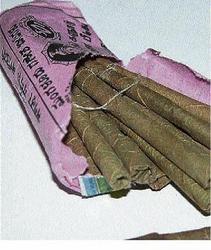
- Ellen Campbell-Grizzle
During drug awareness month, we focus on the various intoxicating drugs and their impact on the Jamaican society. Addictive substances consumed here run the gamut of alcohol, tobacco to ganja and cocaine.
Research demonstrates that drug use and abuse are indicators of underlying social and psychological inadequacies. We also know that knowledge about the dangers of drug abuse is high, particularly among adolescents. Parents know less about the new and emerging drugs that are abused by young people. This is certainly true of the newest problem drug - beady (a.k.a. bidis, beedie, bedie). This drug is smoked by an estimated one out of every seven adolescents here.
What is beady?
There is a wide variety of beady products which is imported into Jamaica. Some look like a small cigarette while others resemble small ganja 'spliffs'. The packages are further embellished with the iconic black, green and gold colours which are attractive to the Jamaican youth.
Beady is unfiltered and its smoke contains high levels of nicotine, tar and carbon monoxide. This puts beady smokers at risk of developing mouth and lung cancers. Persons in the environs of beady smokers are at risk because of second-hand smoke inhalation. Manufacturers add various embellishments to the product such as strawberry, vanilla, chocolate, mango and grape flavours. Beady contains nicotine, tar and carbon monoxide.
Beady is highly addictive and contains up to eight per cent nicotine. Nicotine is the addictive drug in tobacco. When you smoke beady, nicotine goes into your blood stream and reaches your brain within eight to 10 seconds. Nicotine is a deadly poison that causes vomiting, stroke, convulsions and death.

Tar is a sticky, black glob made up of thousands of chemicals and many of them cause cancer. Tar builds up in the lungs and makes breathing harder. It also causes lung cancer.
Carbon monoxide is a poisonous gas that forms when beady is burned. When carbon monoxide is inhaled, it takes the place of the oxygen in the blood and reduces the capacity of the cells to function.
While it is rarely used in the Caribbean, beady has gained cachet among Jamaican youth. In the 2006 survey conducted to determine drug use patterns among Jamaican youth, one in every seven stated that they had used the drug. It is widely available and sold in many supermarkets, gas stations and small shops. Under the Child Care and Protection Act (2004), such sales or serving of tobacco products or intoxicating liquor to children under the age of 18 years are illegal. The Act states clearly that it is illegal to sell such products to children or purchase such products from them. The fines for such breaches can be as high as $1 million.
Let us protect the children
Every Jamaican has a role to play in reducing the demand for intoxicating substances. Parents and guardians must encourage their children to engage in healthy activities. They must be positive role models as well.
Ellen Campbell-Grizzle is president, Caribbean Association of Pharmacists; director, Information & Research, National Council on Drug Abuse; email: yourhealth@gleanerjm.com.

